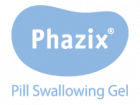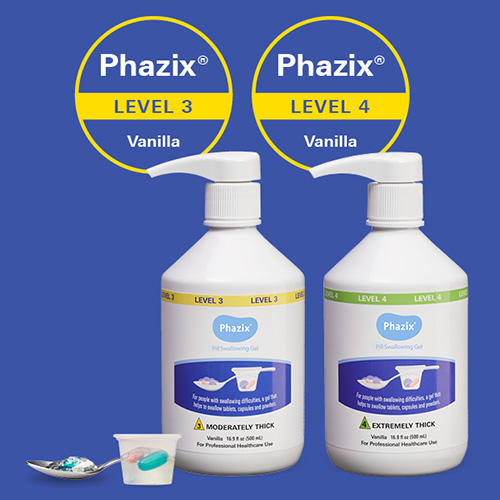
Pill Swallowing Made Simple
A NEW innovation to improve resident care at med pass

For samples or a product evaluation at your facility.
Published Articles
Implementing a medication lubricant for pill dysphagia on an acute care ward using Plan-Do- Study- Act cycles
The objective of this project was to evaluate the implementation of Gloup in the acute care ward setting and assess its acceptability and uptake by patients and ward nurses during medication administration.
Are Medication Swallowing Lubricants Suitable for Use in Dysphagia? Consistency, Viscosity, Texture, and Application of the International Dysphagia Diet Standardization Initiative (IDDSI) Framework
The aim of this study was to describe and compare commercially available medication lubricants in terms of textural suitability for patients with dysphagia. Twelve medication lubricants were characterized according to the International Dysphagia Diet Standardization Initiative (IDDSI) framework.
Food-Drug Interactions
Bushra, R, Aslam N, and Yar Khan, A. Food-Drug Interactions. Oman Medical Journal. Jan 2011: 26(2): 77-83.
This review gives information about various interactions between different foods and drugs and will help physicians and pharmacists prescribe drugs cautiously with only suitable food supplements to get maximum benefit for the patient. Food-drug interactions can produce negative effects in safety and efficacy of drug therapy.
McCabe-Sellers B., Frankel E.H., Wolfe J. “Handbook of Food-Drug Interactions.” Boca Raton, FL: CRC Press. 2003; 12: 262-266.
Mixing medication with foods is a common practice that may adversely affect efficacy. Commonly prescribed drugs such as aspirin, steroidal and nonsteroidal anti-inflammatory agents can cause acute inflammation if delayed in their passage through the esophagus. Food intake in relation to drug administration can have a significant impact on drug dissolution and absorption. The presence of food changes gastric motility, changes the gastric pH, and provides substances for drug and nutrient absorption.
Moses, G. Don’t Take Your Medicine With Fruit Juice! MIMS Matters.
Research shows that fruit juices, particularly apple and orange juice, can significantly alter drug absorption. Fruit juice drug interactions are clinically relevant for two reasons: 1) Fruit juice may increase or decrease drug levels, 2) The greatest impact of the interaction happens when fruit juice is given at the same time a person takes their medication. Fruit juices may render some drugs ineffective. Patients should be advised to take their medicines with water rather than fruit juice.
General Pill Swallowing Difficulties
Carnaby-Mann, G. and Crary, M. Pill swallowing by adults with dysphagia. Archives Otolaryngology Head and Neck Surgery. Nov 2005: 131(11):970-975.
Dysphagia is currently estimated to affect more than 18 million adults in the United States. A recent national survey revealed that over 40% of adults in the general community experience problems swallowing pills. Of adults who reported difficulty swallowing pills, 14% disclosed that they had delayed taking a dose of their medication, and 8% had skipped a dose completely.
Eidex, B. Achieving medication adherence: creativity, consultation and community. Drug Store News. June 2019.
Poor medication adherence results in 33% to 69% of medication-related U.S. hospital admissions at an estimated cost of $100 billion annually. Improving rates of medication adherence in the patient population has long remained an area of focus among pharmacists. Patients who regularly take their medications as prescribed demonstrate better clinical outcomes. Moreover, adherence results impact the retail pharmacy financially.
Forough, A. A spoonful of sugar helps the medicine go down? A review of strategies for making pills easier to swallow. Patient Preference and Adherence. 2018:12: 1337-1346.
Making modification to medication such as crushing or splitting for ease of swallowing difficulties have been associated with increased risk of medication misadventures, adverse drug reactions, and in some cases have fatal consequences. Foods or drinks such as yogurt, jam, juices, and milk are used as an aid in which the whole pills can be hidden, or crushed tablets or capsules contents are mixed to facilitate swallowing and improve palatability of the medication particles. Mixing medicines with food or drinks increases the possibility of food-drug interactions and can potential result in increased or decreased therapeutic effect by altering the bioavailability of the drug. While understanding and resolving the underlying cause of medication swallowing problems is generally the preferred approach, sometimes this may not be possible.
Jaspersen, D. “Drug-induced oesophageal disorders: pathogenesis, incidence, prevention and management.” Drug Saf. Mar 2000. PMID: 10738847
Drug-induced injury of the oesophagus is a common cause of oesophageal complaints. More than 70 drugs can cause esophageal disorders such as esophagitis, an inflammation of the lining of the esophagus. Capsule or tablets that are commonly delayed in their passage through the oesophagus can also lead to acute inflammation. Many physicians and patients are not aware of this problem.
